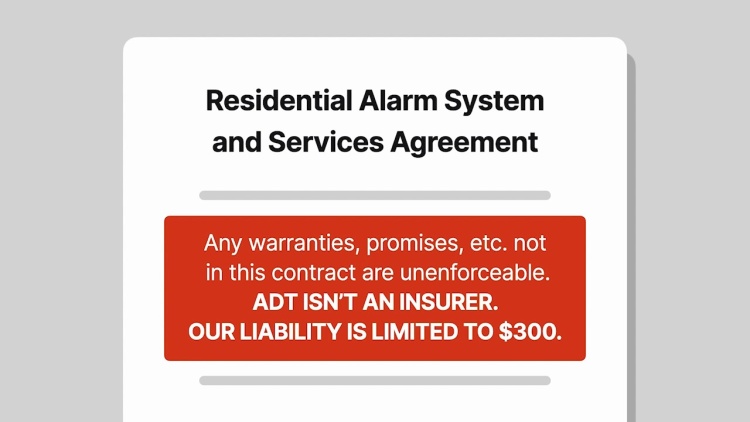Frost v. ADT, LLC
United States Court of Appeals for the Tenth Circuit
947 F.3d 1261 (2020)
- Written by Angela Patrick, JD
Facts
ADT, LLC (defendant) provided a service that monitored its clients’ homes for emergencies. ADT’s website said that if its system detected a disturbance at a client’s home and ADT could not confirm that it was a false alarm, ADT would contact emergency personnel. Elizabeth Frost signed a contract to have ADT provide security monitoring for her home for $37.99 per month. The contract was a preprinted document that was drafted by ADT and presented to Frost on a take-it-or-leave-it basis, i.e., Frost was not allowed to negotiate for different terms. The contract stated in bold type that (1) ADT was not an insurer (e.g., of Frost’s life or property) and (2) any claim regarding the contract had to be filed within one year of the triggering event. The contract also (1) limited ADT’s contractual liability to a maximum of $300, (2) contained an integration clause making any promise not in the contract (e.g., a promise only on ADT’s website) unenforceable, and (3) did not contain a promise to contact emergency personnel if an alert was not confirmed as false. A fire started in Frost’s home, which set off an alert at ADT. The ADT employee attempted to reach Frost but was unsuccessful. The employee then cleared the alert and took no further action. Frost died in the fire. More than a year after the fire, Frost’s estate and child (plaintiffs) sued ADT for not having fulfilled its website promise to send emergency personnel when the ADT employee could not reach Frost. The district court found that the contract’s liability-limiting terms, e.g., the one-year filing provision and the integration clause, barred the claims and dismissed the lawsuit. Frost’s estate and child appealed, arguing that the contract’s liability-limiting terms were unconscionable and, therefore, unenforceable.
Rule of Law
Issue
Holding and Reasoning (Tymkovich, C.J.)
What to do next…
Here's why 907,000 law students have relied on our case briefs:
- Written by law professors and practitioners, not other law students. 47,100 briefs, keyed to 996 casebooks. Top-notch customer support.
- The right amount of information, includes the facts, issues, rule of law, holding and reasoning, and any concurrences and dissents.
- Access in your classes, works on your mobile and tablet. Massive library of related video lessons and high quality multiple-choice questions.
- Easy to use, uniform format for every case brief. Written in plain English, not in legalese. Our briefs summarize and simplify; they don’t just repeat the court’s language.





